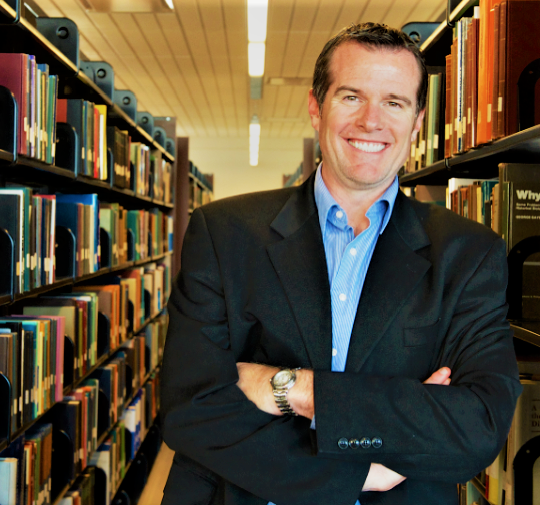Education, and the world of educators, is its own. . .art. The transfer of knowledge from one human being to another is a skill in its own. It requires patience, diligence, precision, and most importantly. . .creativity. Transmitting knowledge is a form of healing, and the sustaining of life. After all, knowledge comes through words, emotions, or lived experiences. Knowledge is a. . .living thing. It is movable, fluid, cross-sectional, and occupies any space, where it enters. Furthermore, it is so powerful, that it has the power to give life or take it away. Literally, and in every sense of those terms. It is why, those who transmit knowledge must be well. In Mind. Body. Spirit. Educators must have a healthy, physical vector, where they are able to receive proper energy. A space where they are able to feel nourishment of themselves and profession, in the classroom. Knowledge should be nutritious. It should be fruitful. And fruit provides vitamins to one’s mental Spirit. Its energy, consistently being re-cycled again and again.
In the United States, it is all too apparent, that classrooms have become a time bomb for many teachers. Spaces of stress and being overwhelmed has prevented many teachers from truly making the learning process a magical wonder. And, that wonder doesn’t just have to stay within a certain age group. It can be carried into middle and high schools.
When we imagine and understand the craft of knowledge, we are going through a consistent cycle of energy being able to illuminate, stimulate, and exercise the brain tissue within our minds. The mind impacts every single component and system within our body. It is why, care of the mind is so important. So, when we look at the responsibility and concept of educators, we have to dig deeper into the true role of an educator as it relates to the care of mental well-being and elevation in the minds of children. Yet in order for that to take place, educators must be healthy, themselves. You can not give what you, yourself, do not have. Such is truly significant as spiritually, emotionally, and mentally malnourished educators can accidentally (or intentionally) transfer that energy to children. It could ruin, or diminish, any gift (s) of a child. It is now important, more than ever, that initiatives for teachers (and those in the educational field) to be involved in the movement of mental wellness and health, be mandatory in educational systems.
There is a magical element to teaching. That very spirit of not only presenting knowledge to children, or young adults, but getting them to grapple, create, question, analyze, and bring into fruition new ideas (and concepts) which are related to knowledge, which has been brought forth. Turning into the Universal realm, in order to make sense of our matriculation on Earth-in whatever subject or discipline, it may be. The unfortunate aspect is that few teachers have taken to understand that particular dimension of conveying knowledge; though we all experimented (and grappled with it) with it as children. Its only when we “grew up,” and entered into adulthood, that we abandoned all interaction with that world. And then, there are those who not only returned to that world, but are traveling the world, in order to train educators to use this world, in enriching the classroom; thereby, elevating the educational experience for children.
One of the leaders of such is none other than leader, educator, and international speaker. . .
Dr. Danny Brassell
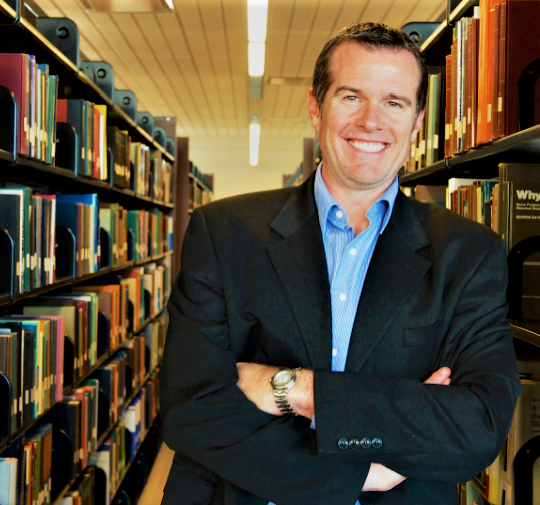
Lauren K. Clark: Let’s go back to that first moment when you knew that you had a passion for children and education. How did teaching transform your entire persona and individuality?
Dr. Danny Brassell: My entry into teaching was a bit embarrassing. I was a journalist, and the newspaper jobs I was being offered paid less than the poverty line. A friend suggested I apply for a teaching position in South Central Los Angeles, and the position paid nearly $9,000 more than the best reporting job I could find.
Dr. Danny Brassell: So I became an educator for the “noblest” of reasons: the high pay! Actually, what really inspired me to teach was the film Stand and Deliver, about Jaime Escalante going to Garfield High School in East Los Angeles to teach Calculus. I wanted to be “that” teacher who inspired students. Well, my school district shuffled me from teaching high school students to middle school students to upper elementary to lower elementary to pretty soon – instead of preparing students for college I came home every day with snot marks all over my pants from where my little ones hugged me.
Dr. Danny Brassell: My school district had very limited resources, and I saw that children did not even have access to many books at all – let alone, high-quality books. And that is why I became passionate about transforming struggling and reluctant readers into more passionate and proficient readers. My gift is showing kids the joys of reading, and that is what I share with teachers, parents and students at freereadingtraining.com. Seeing students who grew up with so little in terms of resources and emotional support made me feel quite ashamed of myself, as I quickly realized I had lived a charmed childhood. My parents were always together, we never worried about our next meal and plenty of people encouraged me while I was growing up. So when I encountered students who had been abused physically and emotionally, my view of the world drastically changed. Teaching no longer offered me extra pay; it provided me with my life’s calling.
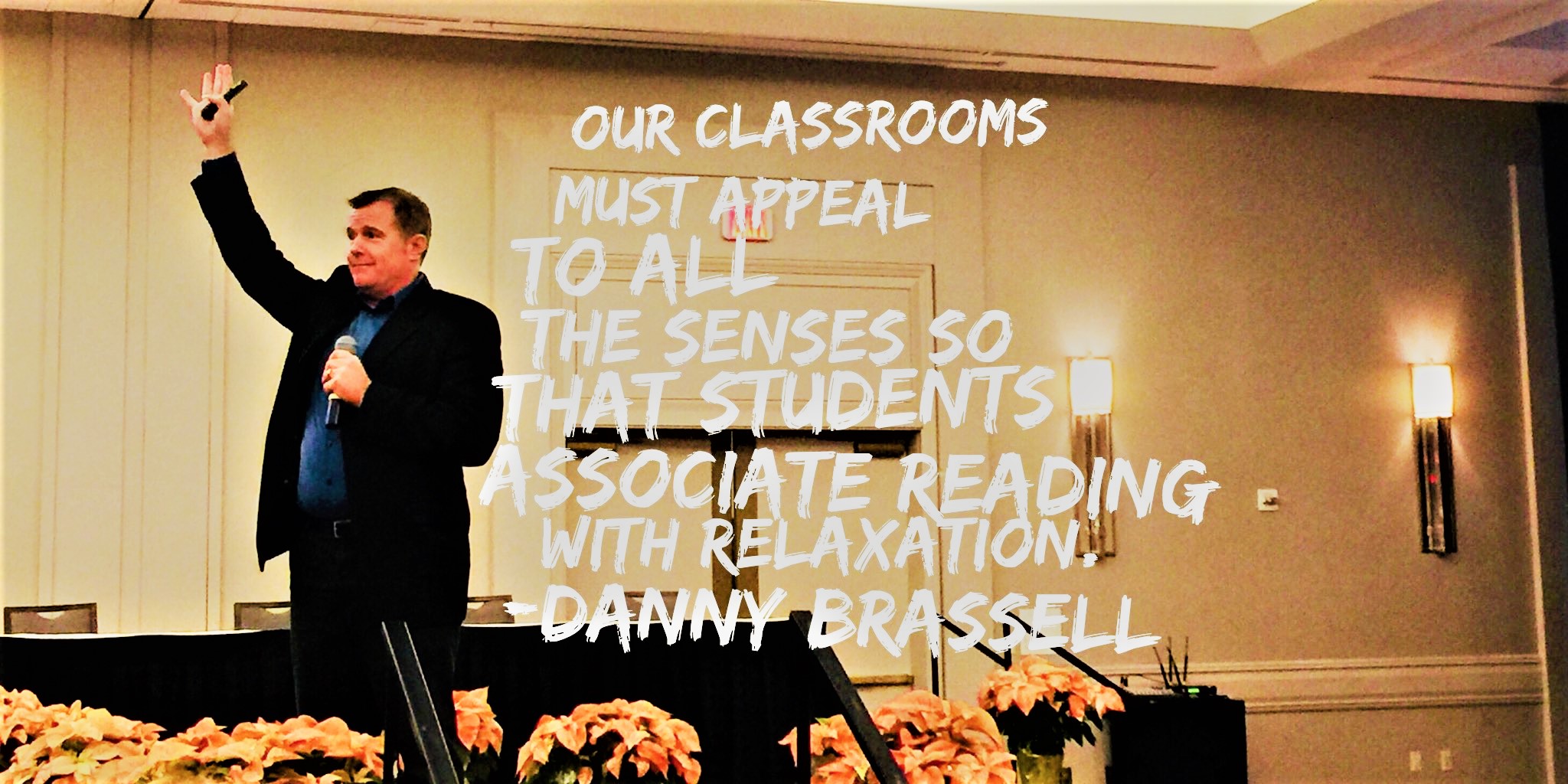
Lauren K. Clark: What is it about childhood fantasy and imagination, on which teachers and adults should immerse more into? What societal pressures forces adults to remove themselves from these worlds?
Dr. Danny Brassell: When I was in kindergarten, Sister Roseanna asked our class if we wanted to go to heaven. All of us raised our hands except Hector.
“You don’t want to go to heaven!” Sister Roseanna yelled, clearly perplexed.
“Oh,” Hector replied. “I thought you were talking about today.”
Kids and adults think differently.
There’s a great scene in the movie Big where Tom Hanks, a kid who has turned into an adult, is attending a meeting at his toy company with a bunch of executives. When one executive pitches a new toy, Hanks raises his hand and innocently asks, “What’s fun about that?”
See, the adults created something they thought kids would like. But Hanks understood as a child that there was nothing at all engaging about the toy. And that scene has really shaped my teaching philosophy for over 25 years.
Marcel Proust said, “The real art of discovery consists not in finding new lands, but in seeing with new eyes.” The more we teachers and parents try to see the world from children’s perspectives, the better we can serve them.
“We are losing too many good educators in the United States. The statistics are staggering. We lose over half of our teachers in their first six years on the job, while we lose half of our educational administrators in their first three years.”
Lauren K. Clark: In one of your lectures to educational leaders, you mentioned your 1st grade teacher, Sister Theresa, and how she was instrumental in exposing your class to creative ways of learning-especially through the book, Million Dollar Cats. Outside of never forgetting the information, how did her strategy get you excited to a different vibe and way of learning? How did it make learning magical?
Dr. Danny Brassell: Sister Theresa sat all of us first graders down on the reading carpet one day, and she read to us the book Millions of Cats by Wanda Gag. It’s an old book written in the 1920s, I believe around the time Sister Theresa was a teenager.
As she read aloud to us, she came to a passage where she shouted at us with the scariest eyes, “Hundreds of cats! Thousands of cats! Millions and billions and trillions of cats!”
And do you know what all of us first graders did? We screamed for our lives! I will NEVER forget this book because of Sister Theresa.
Well, many years later when I became a teacher, I realized, “Oh – that was good teaching. It stuck in my head.” Now, I do not believe in traumatizing children, but I do believe in helping kids retain information. And when I reflected on that, I realized that the key to all of my lessons – the best way to help students comprehend and remember anything – is by creating memorable experiences.
To make learning “magical,” we need to provide “edu-tainment.” Sometimes I’ll teach in silly voices, or maybe I’ll wear a silly hat. I’ve had students remember lessons because we incorporated silly movements or songs to what we were learning. See, I believe that anyone can teach, but to be a really good teacher takes a lot of creativity, patience and hard work.
And that’s what I convey in ReadBETTERin67steps.com. In 67 days – just a little over two months – I help people learn to read MORE, read BETTER and LOVE reading.
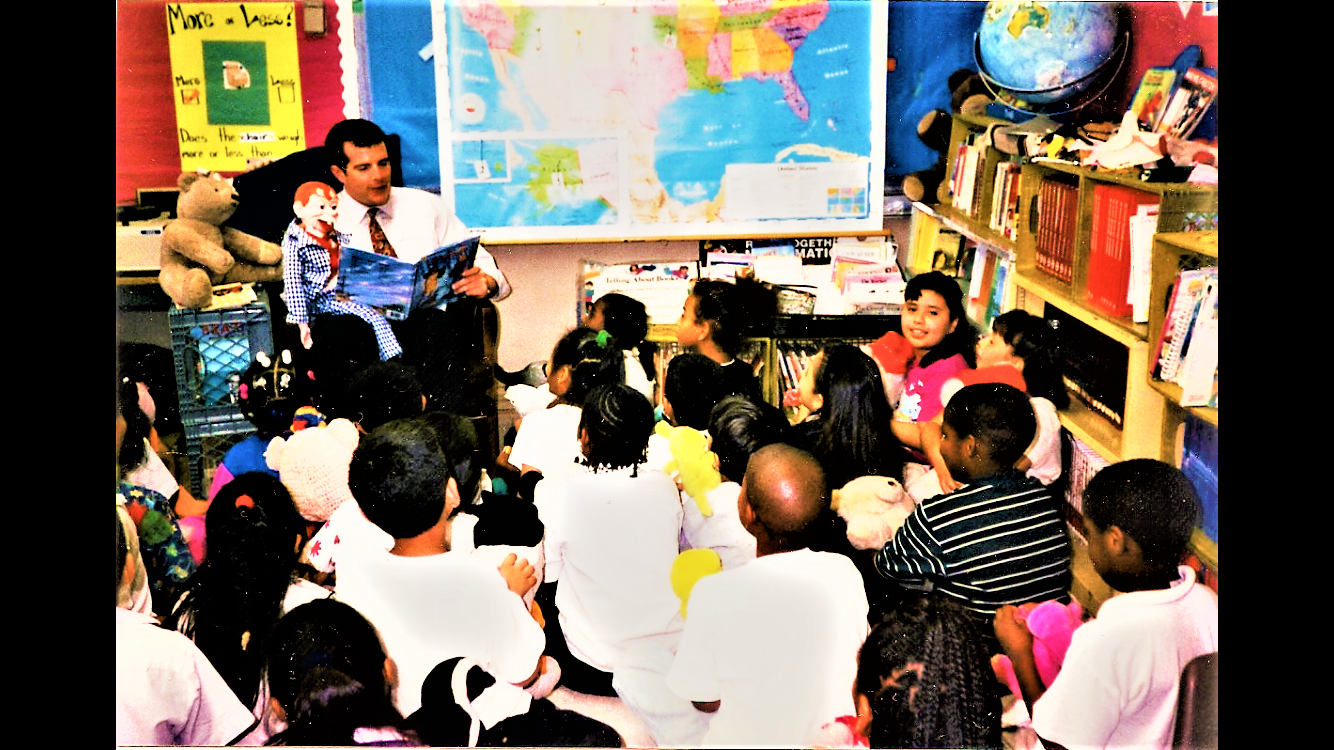
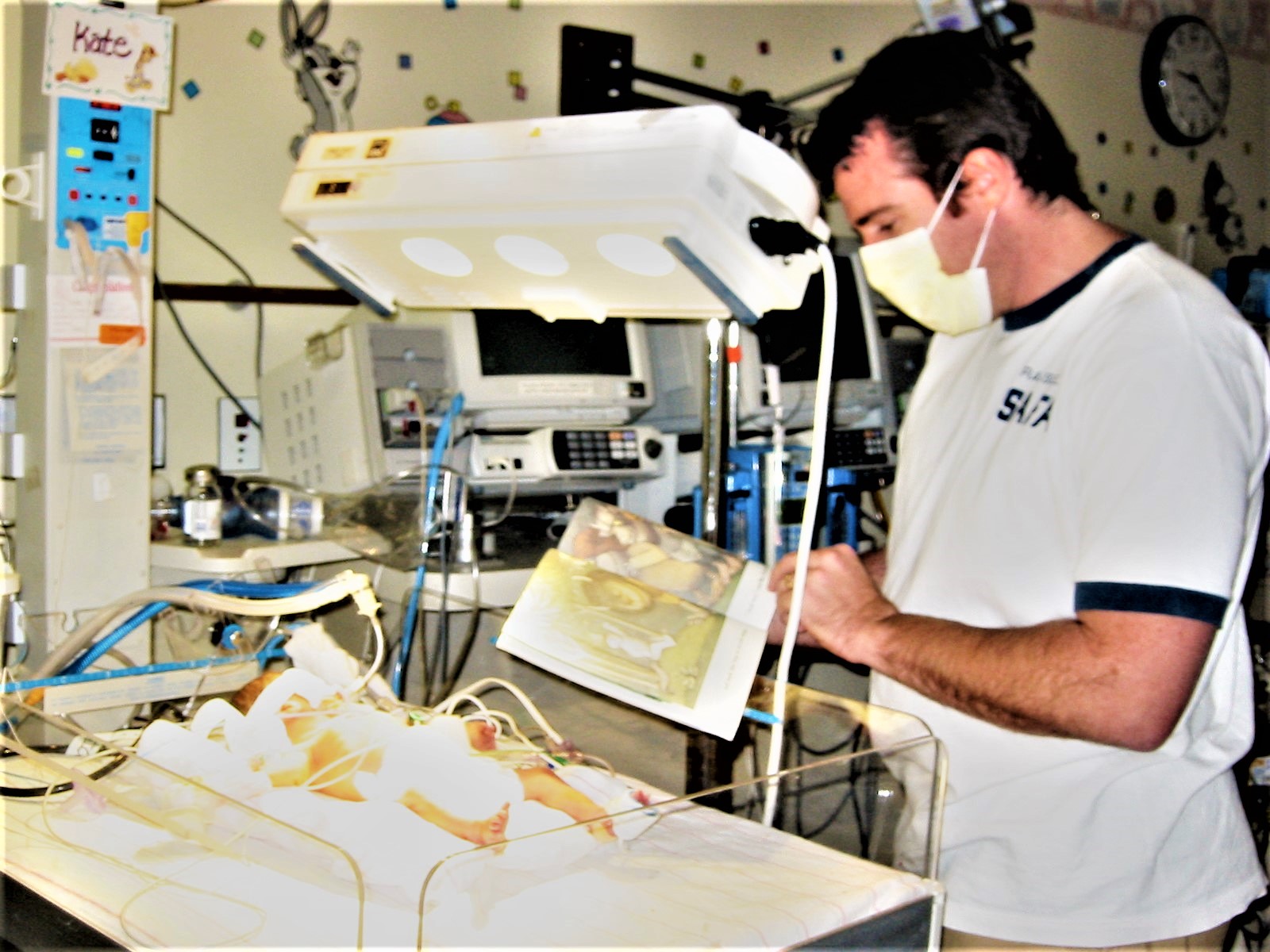
Lauren K. Clark: How have you observed the staleness and dead energy of teaching, which has plagued way too many US classrooms?
Dr. Danny Brassell: We are losing too many good educators in the United States. The statistics are staggering. We lose over half of our teachers in their first six years on the job, while we lose half of our educational administrators in their first three years. I’m on a mission to bring joy back into education by reminding educators to take their jobs seriously without taking themselves seriously.
Open up a newspaper or watch the news, and they want to blame just about every societal ill on educators. I encourage any of those critics to do a teacher’s job for one week. Nowadays, all administrators hear from district leadership is, “We’re cutting your budget, and you better get those test scores up.” And yet what do we have to show for the billions we’ve thrown at “accountability.”
I see so many educators who are burnt out because of standardized testing, which puts a constant strain on time and money. More tests are not the solution. My solution is to dump them altogether and reinvest that money in field trips, art and music programs, physical education, school counselors, libraries – things that kids enjoy (and educators enjoy, too)!
Lauren K. Clark: In one of your real-life experiences, you highlighted a moment of recognizing the importance of protecting gifted students from bad teaching. That moment when you decided to resign from the school, where you taught. Doing so caused you to go into a depression. Take us on a journey into how you felt during that period, and why it was so painful for you.
Dr. Danny Brassell: Jonathan was one of the most gifted and talented students I ever had the pleasure of teaching.
One day, Jonathan’s mother – a single mother raising Jonathan and his older sister while working three jobs – asked me a startling question.
“Mr. Brassell,” she said. “Jonathan looks at you like a father. If you were his daddy, what would you recommend that I do?”
And the word that came out of my mouth was “Move.” Why? Her son was gifted and talented, and my school district did not offer a “gifted and talented” program. And I knew that if Jonathan stayed at my school the following year, he would get Ms. Hampton as a teacher. And Ms. Hampton would do her best to destroy this beautiful young man because she was a direct descendant of Darth Vader.
Realizing that that is what I believed, I chose to resign that day rather than be a hypocrite. I wound up teaching the class for the rest of the school year, but when the school year ended, I left the classroom for good. And I fell into a deep depression because I could not get it out of my head that I had failed at my calling.
Well, I wound up accepting a position at a university where I trained teachers and administrators. And one day, my mother – who is a “peppy” person – gave me a huge motivational talk.
“Don’t you see?” she said. “Don’t you see, Danny? Now you get to help other educators not quit. You’re going to affect so many more kids this way!”
And that is why I do what I do now. I see so many educators who are down on themselves, and there is nothing more fulfilling than when a stranger as attended one of my talks or invested in my online program introduces themselves to me and says, “You know, I was ready to quit, but you reminded me why I do this in the first place.”
So, one door closed, and another opened. From pain comes progress.
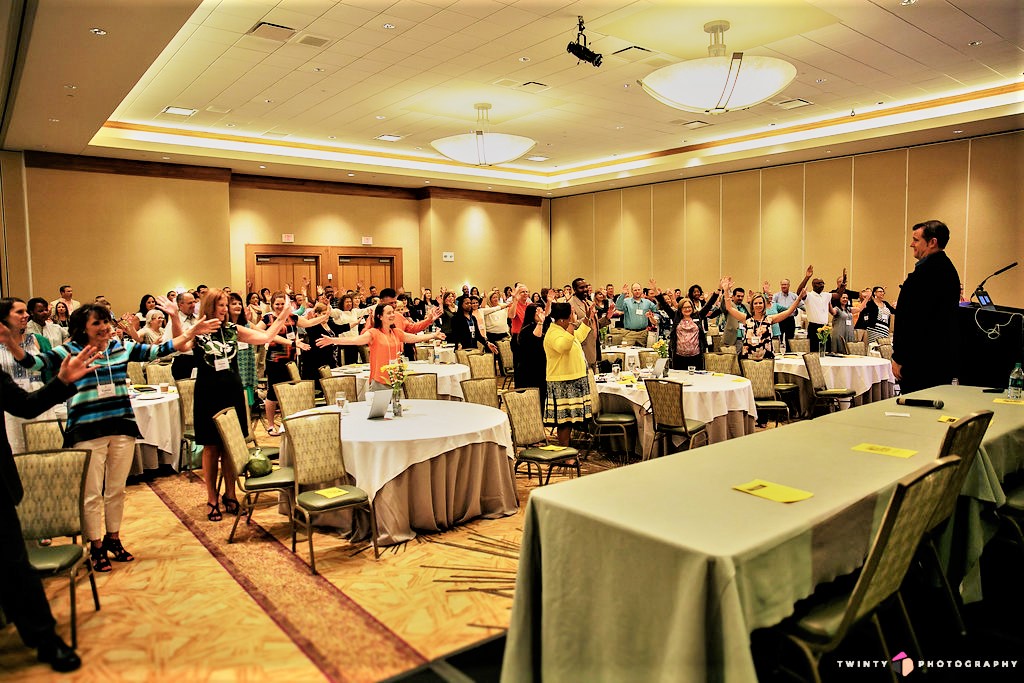
Lauren K. Clark: You have an animated way of capturing your audience. How has it gotten your audience members-especially educators-out of their comfort zone?
Dr. Danny Brassell: I have taught all age levels – from preschoolers to rocket scientists. I can make that claim because I used to teach English as a Second Language to Engineering students at the University of Southern California. And what I have learned is that what works for a twelfth grader – doesn’t necessarily work for a kindergartener. But what works for a kindergartener works for ALL ages!
The most important thing teaching little kids taught me was to take my job seriously without taking myself seriously. I’m not “all that,” and neither are you. And if you think you’re hot stuff, teach kindergarten for a week. Those little ones will set you straight.
One of my little girls, LaShonda, once raised her hand in the back of the room, and when I asked her what she needed, she responded, “Mr. Brassell, when are you going to trim your nose hairs?” I covered my nose and replied, “This afternoon, LaShonda. Thanks for bringing that to my attention.”
Adults are too uptight, and I have made a conscious decision to “loosen-up” audiences by accommodating a variety of learning styles in each of my talks – from singing and dancing to drawing and acting silly. Oddly, I have an easier time prompting business executives to do these things than I do teachers. It’s like they’re yearning to leave their comfort zones.
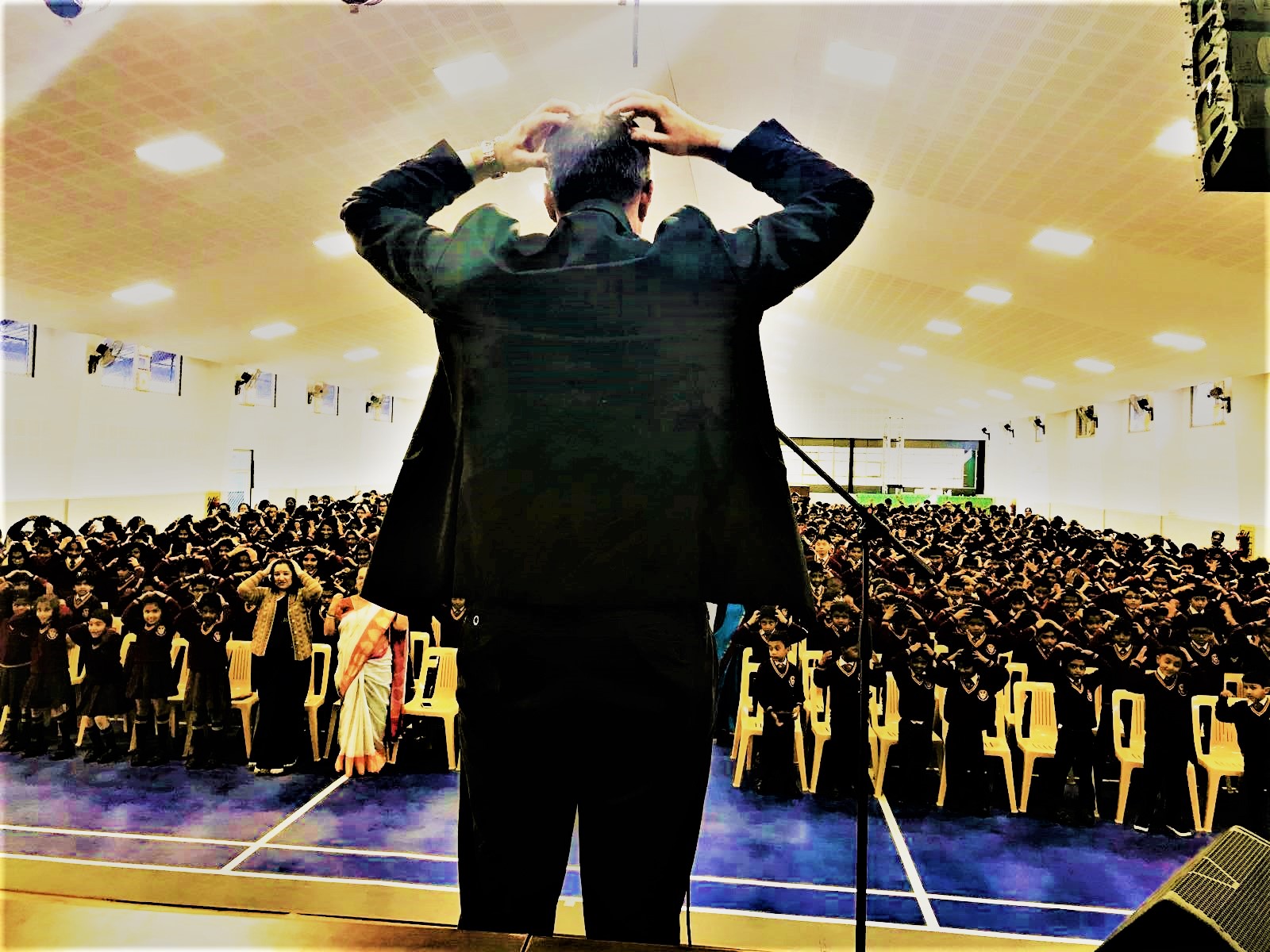
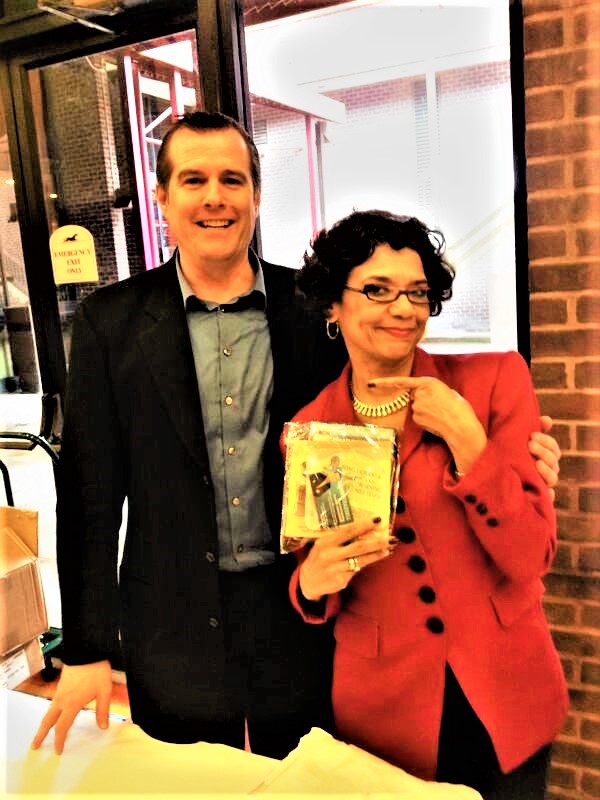
Lauren K. Clark: From your perspective how does vivacious and illuminating energy from teachers and educators, reflect back to the performance of students? How does it transform students from seeing education as a torture chamber to a magical world of infinite exploration and creativity?
Dr. Danny Brassell: Enthusiasm is contagious! The more you’re “into it,” the more your students will be. Former CIA Director James Woolsey said, “If you’re enthusiastic about the things you are working on, people will come ask you to do interesting things.”
Too many students look at school like it’s a prison sentence. What is going on in America? My kindergartners used to go to bed with their backpacks on, while my eight graders were figuring out ways to get sick. What the heck happened in those eight years to get those kids to hate school so much?
I mean, if I’m doing my job as a teacher, my students should be banging on my classroom door at six in the morning, and they should be in tears when they hear that final school bell ring at the end of the day.
Carl Jung said, “If there is anything we wish to change in the child, we should first examine it and see whether it’s not something that we could be better changed in ourselves.” Simply put: my purpose every day is to make learning so fun for my students that it is as essential as oxygen.
Lauren K. Clark: How does nurture, high-energy, and creativity in the classroom allow students to see themselves as co-creators and magicians in developing knowledge? Furthermore, how does it ease stress in the classroom?
Dr. Danny Brassell: Buckminster Fuller once said that “all children are born geniuses, and we spend the first six years of their lives de-geniusing them.” I couldn’t agree more. Too often schools discourage creativity and encourage conformity.
It is interesting that while I began my career as a secondary teacher, I found my passion teaching younger students. Why? Little ones don’t know what they can’t do yet. Sir Ken Robinson recounts a story about a little girl drawing a picture in class.
When the girl’s teacher asks her what she is drawing, the little girl responds that she is drawing a picture of God. “But nobody knows what God looks like,” the teacher says. To which the little girl responds, “They will in a minute.”
Our job as educators – and I include parents in this because, after all, they are the most important educators – is to nurture children’s natural curiosity. We need fewer dream-killers and more cheerleaders. This is why I believe grading is such a waste of time. Show me the research on the relationship between grades and learning. I know I earned plenty of As in classes I did nothing in, and I earned Cs in classes where I worked my tail off in and learned more in those classes than all my others combined.
When I ask people what the opposite of success is, most will blurt out “failure.” But that’s entirely wrong. To succeed, you need to fail a lot. The opposite of success if quitting…or not trying. And I see too many schools searching for standardized “right” answers without seeing that other possibilities exist – and may be even better.
Want to ease stress in the classroom? Encourage failure. Nothing great was ever accomplished without a lot of failure.
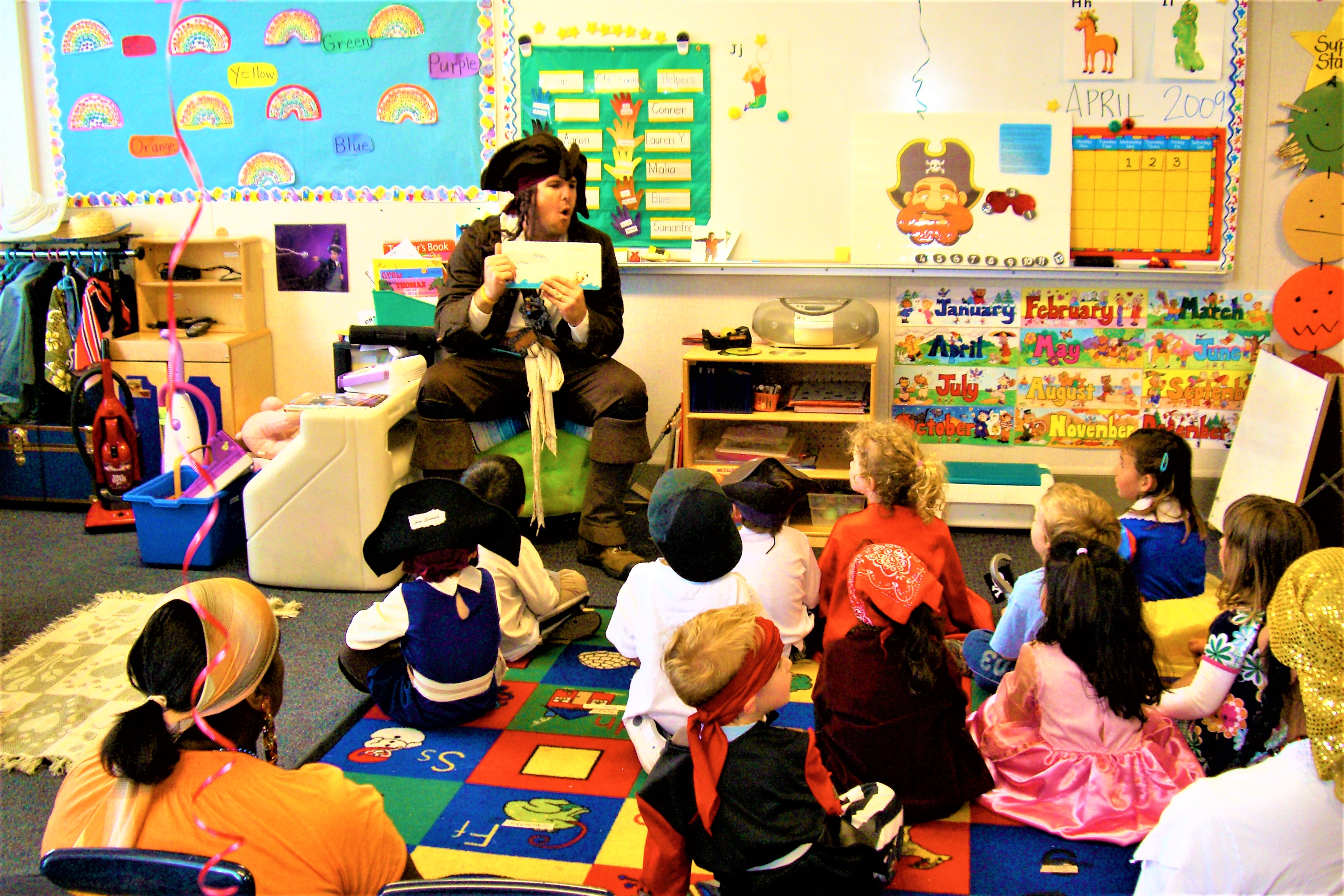
Lauren K. Clark: We often speak on the holistic energy that we give to children. So, let’s go into the dimension concerning how students give that energy back to educators. What have been some of the most teachable moments by students? How did their energy and Spirit get you through difficult times?
Dr. Danny Brassell: Many years ago, I asked a woman to marry me, and she declined. It served as a good reminder that all of us are thrown curve balls in life.
When my little ones used to misbehave, I would send them to an isolated desk called “Time-Out.” There, students had to write me an apology, and the best one I ever received was from a little girl named Erika. It read:
“Dear Mr. Burcell (sic), I’m so sorry I was bad in class today. I love you. I would have married you”
Yup. That was a keeper.
I think what made me love teaching little ones was their capacity for forgiveness and moving on. Little boys who literally had been beating each other up would pat each other on the back ten minutes later and announce, “This is my best friend!”
Adults could learn a lot from kids if we’d just stop and pay attention.
Lauren K. Clark: As a former educator, and now educational leaders, how has the teaching environment caused stress for many teachers? What is the cause of this, and how can it be resolved?
Dr. Danny Brassell: It says a lot about society that in the 1950s, teachers’ top concerns were students talking without raising their hands, while today it is active shooters. And rather than having an “adult conversation” and discussing ways to prevent this, Americans prefer to play “the blame game.”
And for some reason, there is a massive “accountability” push in education. More and more, I see teachers being evaluated strictly on test scores, which I think is ludicrous. I’m a parent of three, and it is more important to me that their teachers foster a love of learning in my children than raise their test scores.
We’re losing a lot of great educators because society seems to unload all of its problems on schools. Should teachers get a raise? Absolutely, but short of that, a huge step in the right direction is by lifting up teachers rather than tearing them down. Based on all we ask of educators, we should be having parades in their honor.
Lauren K. Clark: You have spoken to audience members and educators across the country. What are some of the main issues, and conversations that educators are having in enriching the energy of their students, while making sure that their energy, too, is being sustained?
Dr. Danny Brassell: What did one of the world’s greatest soccer players of all time and one of the world’s richest men teach me? Plenty!
Reading is key. While I think schools do a decent job of teaching kids how to read, I often ask educators, “What good is it teaching kids how to read if they never want to?”
Look – schools are inundated. Too many students, not enough time. I understand, as I have been in the trenches. Teachers and administrators are too often overwhelmed by the push to boost standardized test scores, address the latest academic standards and provide the critical individual attention that every child needs. Trying to meet the relentless demands of parents, the media and the public is no easy feat. It can become daunting and discouraging.
There has to be a better way, right? That’s why I created ReadBETTERin67steps.com, the world’s leading reading engagement program. I teach kids why to read so that they choose to do it on their own. And the more they read, the better they get at it.
Schools have too much on their plates. While parents often enlist the help of outside learning centers, these programs typically offer lackluster, antiquated approaches that stress testing outcomes over long-term student engagement. Worksheets and practice tests are not optimal tools for boosting students’ interests in reading.
I knew there were better ways to entice children to read more and help them read better. And I knew it could be done at a minimal cost and time commitment to schools and parents.
ReadBETTERin67steps.com teaches parents how to instill a love of reading in their children, in less than 30 minutes a day! Educators love the system as the program trains parents ways to encourage children to spend more time reading outside of school every day. The program requires no fancy worksheets or practice tests. It works for anyone who follows the system.
To read better, kids need to read more. The key to success in anything is by establishing routines – habits.
Taught to play football by his father, Edson Arantes do Nascimento could not afford a proper ball. But his father helped him craft a sock stuffed with newspaper and tied with a string or a grapefruit into a ball, and his father encouraged him to play frequently. Instilled with a passion to practice every day – not any particular inherent skill or gift – is what the young man who grew up to be known as Pelé credited with his success as a soccer player.
Minutes matter. ReadBETTERin67steps.com shows parents and educators how to find the time to make reading a priority that children anxiously partake in every day. I don’t teach people how to teach students to read. And I don’t teach people how to get students reading faster. What makes my program different from every other product on the market is simple: I show parents and teachers how to get children to love reading! I give my recipe for success, the same recipe that has helped thousands of parents and educators around the world – from India to Egypt, Argentina to the United States!
When asked how reading avidly has contributed to his success, billionaire philanthropist Bill Gates said,
“You don’t really start getting old until you stop learning. Every book teaches me something new or helps me see things differently. I was lucky to have parents who encouraged me to read. Reading fuels a sense of curiosity about the world, which I think helped drive me forward in my career.”
I want to bring the joy back into education by transforming struggling and reluctant readers into more passionate and proficient readers who read MORE, read BETTER and LOVE reading.

Those individuals, who are blessed enough to re-discover the genius of childhood, as a reminder for the adult world, that they are never too grown to explore that dimension. Education is a wondrous adventure of its own. It is fun-filled. Rich in discovery, and endless in abundance. It sustains, and is interlocked, with our life’s journey. Therefore, when we present it, we must treat it, as such. That same high-level energy of its authenticity, must be maintained, when it is being transmitted to students and children. When done so, and done well, there can never be such a thing as boredom in the classroom. When done with adventure, heightened enthusiasm, and nourishment to ease mental hunger and inquiry, there can never be such as thing as students hating school.
The idea of school being a torture chamber, which is mandated in order to succeed in life, needs to be abolitionist. On the contrary, education and school should be transformed into a magical playground, where it is seen as the essence of life. With that being stated, once our mental on the presentation of school (and education) is transformed, then school is seen as an essential naturalness, on which we can not live without. The understanding that it is connected to our lives and very existence. And if such is the case, how do we discover (implementing it into) how our own identities, individuality, and creativity, contributes in shaping it. Knowledge is the magic, and school is the incubator for it. With that being stated, how do we design and generate knowledge’s similar magical energies in our presentation?
How do we fill classrooms and schools with that same nutritious and inquiring aura, that knowledge possesses?
Well, one professional is providing the clues for such answers. Traveling around the world, he is presenting, and performing, these clues for those willing to learn. He plants the seeds. Yet, after the show is over, its up to audience members to do the work for their own educational discovery. Meaning that they will go through a personal, educational journey of trial and error. Out-dated patterns will have to be thrown out. The plus side is that when walking on this journey, educators will come to discover new attributes, talents, and styles about their own craft, that they never knew existed, or thought possible. Such is the case when educators are willing to go on that path of taking care of self, first. Toxic selves and minds creates knowledge, which is toxic in its energy. And, educators must be gentile, and take care, of that energy. Teachers, too, need healing. They, too, need that level of gentility, in order to transmit a touch of educational gentleness to the students and environments of their labor. And having educational spaces, for that to happen, requires teachers to be cared for. It is then, where they can participate in the magical worlds of childhood, with their pupils. So, with educational wands in hand, let’s continue down the path. Returning to the inner-child that we left behind. She/He has been waiting for us, for a long time. And, with open arms, they will join you, with toys in hand, to accompany you; walking down that road, together!


